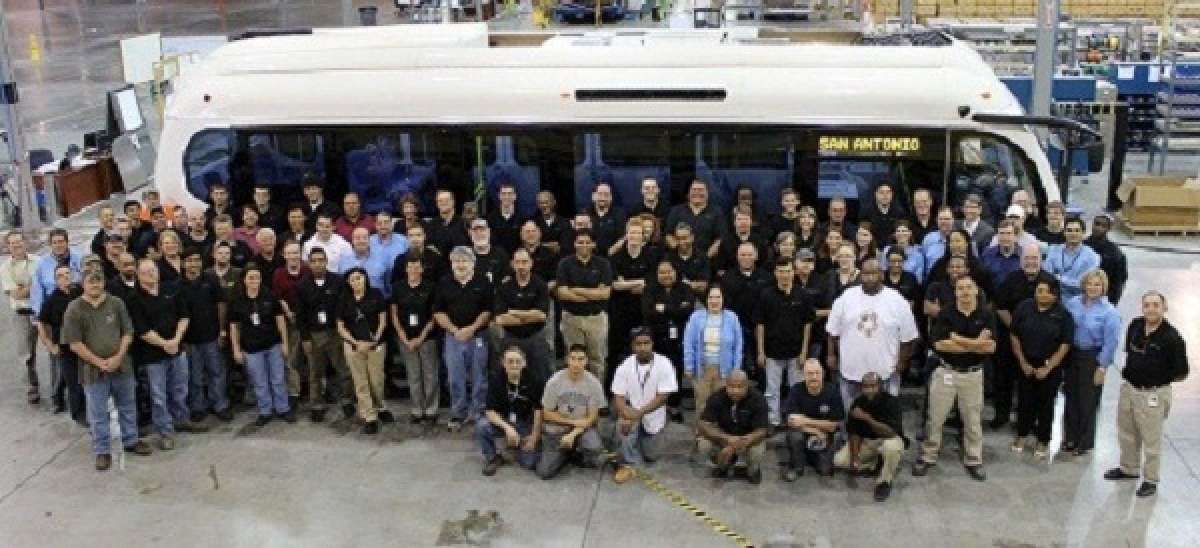City transit buses are essential to our public transportation system in America, as flawed as it may be. Buses enable those who can’t afford a car to get around, make a city more accessible to tourists, and provide convenient transportation at relatively low cost per rider. However, traditional diesel buses are noisy, smelly, dirty, and gobble up fuel at alarming rates.
The passenger vehicle market gets most of the attention in the shift to electric transportation, but buses must not be overlooked. In fact, the typical responsibilities of a city bus make them ideal candidates for electrification. They drive mostly at low speeds, use the brakes a lot, spend a great deal of time idling, and follow pre-determined routes that can easily have 5-10 minute pit stops incorporated into the schedule.
Proterra, Inc. thinks it has the ideal electric bus solution for city transport needs. Their EcoRide BE-35 model is a full capability all-electric bus equipped with a composite body, a surprisingly small 150-kW electric motor that packs a whopping 650 N-m of torque, a three-speed transmission to handle the rigors of heavy-duty transit and keep the motor within a 92%-95% efficiency band, and most importantly fast charging technology that allows the battery to be fully recharged in under 10 minutes.
This fast-charging feature is what makes the Proterra different from other electric buses like those built by BYD. Recharging at such a high power rate effectively gives the bus infinite range, as a quick pre-planned stop after completing a route will allow it to continue on its way with a fully recharged battery. The high charge rates give rise to concerns about battery longevity, so it remains to be seen how the batteries will hold up in the field.
Proterra is a relatively young company but is growing steadily; they shipped 23 buses in 2013 and now have customers in 12 metropolitan areas. These cities include San Antonio, Louisville, Reno, Tallahassee, and Worcester. A map of their current customers can be found here. The company claims fuel savings of $300,000 to $430,000 over the projected 12-year life of the vehicles, and drivers have raved about the quietness and smooth operation of the buses in the field.
Proterra runs test loops in the area where I live outside Greenville, and I can attest to how jaw-dropping these machines are. If one cruises by you and your bicycle, all you hear is the sound of the tires until it has passed and you realize that it wasn’t a golf cart but an honest-to-goodness city bus that just snuck up on you. Obviously, this leads to worries about pedestrian protection, but it would be a small matter to install some sort of noise-making device. And to be honest, I think that whisper-silence is one of the best traits of electric vehicles and should be celebrated rather than fretted over.
They’ve a long way to go and their future success requires cooperative policy-makers, but Proterra is quite frankly one of the coolest electric vehicle companies out there. Every city in America deserves to have a fleet of these buses, and though there are only a lucky few so far Proterra certainly has a bright future.






Comments
That's nice Luke. Could you
Permalink
That's nice Luke. Could you expand a bit on the motor manufacturer, storage capacity, regenerative braking etc, as it's applied to this mode of transportation. Who's manufacturing the system? How is it( quick) charged? What does the Bus retail for ? Thanks.
Parks, I can tell you that
Permalink
Parks, I can tell you that the batteries are supplied by Altair Nano and the motor is a UQM PowerPhase 150 PM motor customized for Proterra. They don't say what the battery capacity is, but I was told by a company rep that the stored energy is more than sufficient for over 1 hour of typical operation before recharging. Their battery packaging and charging system are proprietary; the charging is wireless and occurs overhead. The driver simply pulls into the "alignment scoop" and wireless controls guide the bus to the appropriate position and do the rest of the work. It's a pretty neat system, and it appears as though the charging system (FastFill), powertrain (ProDrive) and battery system (TerraVolt) are all engineered by Proterra to work together to improve efficiency, as all are trademarked as proprietary technology. As for regen, I would imagine the bus has a pretty robust regeneration system to take advantage of the frequent braking on your typical urban bus route. I believe the buses retail in the $800,000 to $900,000 range, but Proterra is working to lower their costs to reduce the sale price.